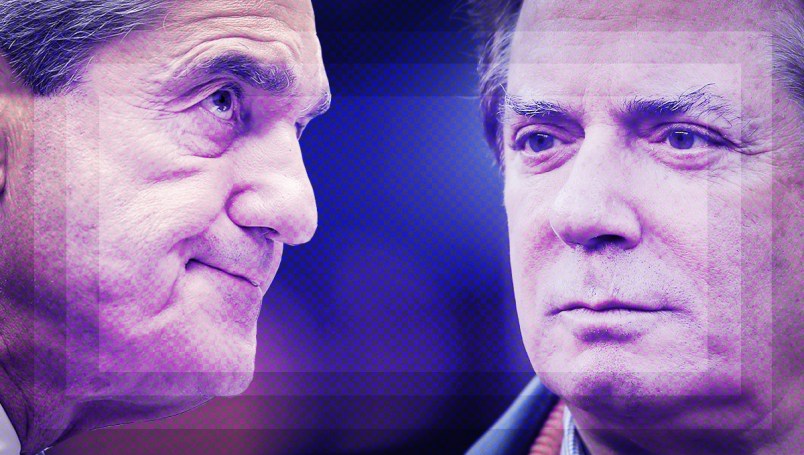While Paul Manafort has claimed, so far without much success, that special counsel Robert Mueller has overstepped his authority by focusing on Manafort’s Ukraine lobbying, Mueller has left hints in various filings that his ongoing investigation into the former Trump campaign chairman may also be looking into something else.
It’s not clear exactly what that something else is, when or even if it will yield additional charges against Manafort, or whether it will bring the Russian collusion case closer to President Donald Trump or his associates. But there has been a series of intimations floated publicly by Mueller that suggest more is going on beneath the surface.
The most obvious signal was an Aug. 2 internal Justice Department memo from Deputy Attorney General Rod Rosenstein to Mueller, disclosed with heavy redactions by Mueller last month, in which Rosenstein confirmed the special counsel’s authority to investigate Manafort for both the Ukraine allegations, and accusations that the Trump campaign and Russian colluded to influence the 2016 election.
Manafort has not been charged with any crimes related to alleged Russian collusion, but there have been subtle clues along the way that suggest that Mueller is still digging into Manafort, and what he’s searching for goes beyond alleged financial and lobbying disclosure crimes laid out in the two federal indictments against Manafort, one in DC and the other in Virginia. Manafort has pleaded not guilty in both cases to charges that include money laundering, tax fraud, bank fraud and failure to disclose foreign lobbying — mostly stemming from Ukraine work that predated the 2016 campaign.
As other people caught up in Mueller’s probe move closer to sentencing — a sign taken by some that they’ve completed their agreed-upon cooperation — the special counsel has other lines of inquiry still cooking, and they appear to overlap with the Manafort investigation.
The latest bread crumb came Tuesday evening, with a federal judge’s order denying Manafort’s request that Mueller turn over unredacted versions of two warrant affidavits: one searching Manafort’s email account at his international lobbying firm, and another targeting phone records associated with five AT&T phone numbers. The phone record warrant was sought this year, the court documents indicate, relatively late in an investigation that broke into public view with FBI raids against Manafort last summer and seemed to culminate with his indictment in the fall.
In arguing to preserve the redactions, Mueller argued in court filings that they only obscured confidential sources or “information relating to ongoing investigations that is not at issue in either of Manafort’s current prosecutions.”
On Tuesday, U.S. District Judge Amy Berman Jackson, who reviewed unredacted versions of the warrants herself, said that the redactions were “appropriate and justified on the grounds set forth by the prosecution.”
“There is nothing in the redactions that relates to any of the charges now pending against Manafort,” she said, seeming to suggest that there were additional matters under investigation that have not been charged.
Yet another clue from Mueller came earlier in a separate procedural dispute over the scope of his authority. In that proceeding, the special counsel name-checked a Vladimir Putin ally who had not previously been mentioned in any of court filings in the case against Manafort. Mueller was arguing that the order appointing him special counsel in May 2017 had given him the authority to probe Manafort’s Ukraine lobbying, and that it fell under the broad umbrella of links between the Russian government and Trump campaign associates. He pointed both to details in the indictments about Manafort’s work for a pro-Russian Ukraine politician Victor Yanukovych, as well as to publicly available information about Manafort’s relationship with Russian oligarch Oleg Deripaska.
“Open-source reporting also has described business arrangements between Manafort and ‘a Russian oligarch, Oleg Deripaska, a close ally of President Vladimir V. Putin,’” Mueller’s team argued. The line referenced a New York Times report that went into detail about Deripaska’s and Manafort’s business relationship, which eventually soured.
The next day, Jackson gave Mueller permission to file under seal what appeared to be an unredacted version of the Aug. 2 memo. It’s not clear how the redacted portions of the Aug. 2 memo fit in or complement Mueller’s public case against Manafort.
Manafort’s own legal team has suggested there is more afoot. Manafort attorney Kevin Downing claimed in an April hearing that there was a third redacted bullet point in the Aug. 2 memo pertaining to Manafort. But at a hearing this month about Mueller’s authority in the separate Virginia case the special counsel has brought against Manafort, Michael Dreeben, an attorney on Mueller’s team, said that all the sections of the memo related to Manafort had already been publicly revealed.
The uncertainty around what else Mueller may be looking at Manafort for comes as the Mueller team has shown a knack for keeping the details of their probes secret. Former Trump campaign advisor George Papadopoulos was approached in an airport by Mueller’s investigators in July 2017, three months before his cooperation with the special counsel became publicly known.
Mueller — in a filing last week in a lawsuit brought by media companies seeking to unseal certain investigation documents, including Manafort warrants — said that his probe is “not a closed matter, but an ongoing criminal investigation with multiple lines of non-public inquiry.”
“Many aspects of the investigation are factually and legally interconnected: they involve overlapping courses of conduct, relationships, and events, and they rely on similar sources, methods, and techniques,” he said.










